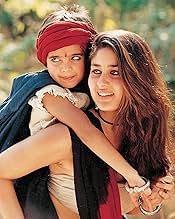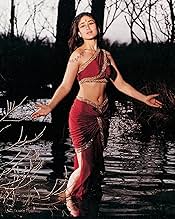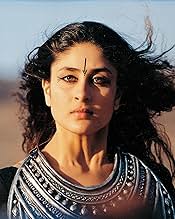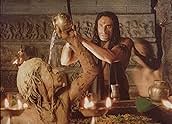The epic tale of King Asoka's life is recounted.The epic tale of King Asoka's life is recounted.The epic tale of King Asoka's life is recounted.
- Director
- Writers
- Stars
- Awards
- 3 wins & 17 nominations total
Gerson Da Cunha
- King Bindusara
- (as Gerson da' Cunha)
Subhashini Ali
- Dharma
- (as Subhashini)
Johny Lever
- Magadha Soldier
- (as Johnny Lever)
Raghubir Yadav
- Magadha Soldier
- (as Raghuvir Yadav)
Sabir Masani
- Giri
- (as Shabir Masani)
- Director
- Writers
- All cast & crew
- Production, box office & more at IMDbPro
Featured reviews
This film is not intended to be derogatory towards Buddhists, but does indeed enact the historical beginnings of Buddhism. King Ashoka was a vicious warrior before he was shown the 8-fold path but his conversion did not occur until much blood was spilled in his land. It is unfortunate that other viewers have a skewed version of the conception of Buddhism and take this film to be negative. Nevertheless, I was impressed at the historical accuracy, the strength of the acting, and the vividness in the vision of the director. He chooses very unique positions to shoot the scenes and uses stop-time in very emotionally effective manners. I recommend this film not only for the story but for the visual elements and as an example of an Indian film that offers more than just song and dance.
original and inventive direction and cinematography? didnt anyone else get the feeling that this was crouching tiger, hidden dragon with an indian story bolted onto it (and that too badly done!)?
where was the history? why dumb-ass and completely extraneous and unimaginative (except by indian standards) song and dance numbers, while a little bit about buddhist philosophy and not just a couple of orange filtered shots of a buddhist monk walking past the sunset?
right, plot...what plot? one scene develops to the next in such a contrived manner, one never knows why the war is being raged or any of the rest of it (eg. arya dying at the end...clearly the filmmakers intended, as is de rigeur in hindi films) that the audience must leave crying. but where is the dramatic role for arya's death? there isnt one...just the same as there is no dramatic kudos to any of the developments in the film, except perhaps to satisfy producers/distributors whims and demands.
direction...santosh sivan has clearly been watching and learning from ang lee and ridley scott amongst others and still manages to direct some of the most cack-handed action ever...could martial arts fight scenes be any more pedestrian?
i wont go on...but suffice it to say, i sat thru this more easily than the typical poor boy meets rich girl, whose father is a corrupt business type...his best friend dies at the end and he gets the girl type hindi film, but pls, dont think of this as original and ground breaking!
where was the history? why dumb-ass and completely extraneous and unimaginative (except by indian standards) song and dance numbers, while a little bit about buddhist philosophy and not just a couple of orange filtered shots of a buddhist monk walking past the sunset?
right, plot...what plot? one scene develops to the next in such a contrived manner, one never knows why the war is being raged or any of the rest of it (eg. arya dying at the end...clearly the filmmakers intended, as is de rigeur in hindi films) that the audience must leave crying. but where is the dramatic role for arya's death? there isnt one...just the same as there is no dramatic kudos to any of the developments in the film, except perhaps to satisfy producers/distributors whims and demands.
direction...santosh sivan has clearly been watching and learning from ang lee and ridley scott amongst others and still manages to direct some of the most cack-handed action ever...could martial arts fight scenes be any more pedestrian?
i wont go on...but suffice it to say, i sat thru this more easily than the typical poor boy meets rich girl, whose father is a corrupt business type...his best friend dies at the end and he gets the girl type hindi film, but pls, dont think of this as original and ground breaking!
Asoka is a movie by acclaimed cinematographer and director Santosh Sivan, and it is clearly evident from his latest venture that he is about to change the celluloid world forever. The movie is an epic and the first example of International Indian cinema on a wide scale, bigger canvas and projected through the eye of a master filmmaker.
The film begins with the young Prince Asoka (Shah Rukh Khan) as a boy who watches his father accept Jainism, a peaceful religion that encourages him to toss aside his sword, which has caused much bloodshed. The young boy is intrigued by the weapon and picks up the new toy, masters it and soon learns that with the power of yielding this sword comes a great price. A warrior is born who fights many battles yet it is quickly established that this young man is very much fighting human wars, quenching a thirst for power and balancing this with his love for his family, particularly his mother. His mother renounces her son's violent ways and requests him to undergo the greatest education any person can: a journey.
On his journey as an ordinary traveller, the prince encounters friends and learns to eat peasant food with his trusty horse Pawan, who mirroring an opposite reflection to Asoka's seemingly black heart, is pure white with eyes that steal the heart of anyone who gazes into them. While exploring through a forest he meets the Princess Kaurwaki (Kareena Kapoor), whose eyes mesmerise one moment and warn off invaders in a blink. She is the embodiment of beauty and the prince introduces himself as Pawan to her, only to find there is a price on her head and she, accompanied by General Bheema (Rahul Dev) and young Prince Arya (Suraj Balaji), are on their own journey to make it alive to Kalinga where their destiny awaits them.
The journey of Asoka continues with trials and love, jealousy and betrayal, all making up cornerstones of what Prince Asoka experiences along the way. He falls flawlessly in love with Kaurwaki, and she becomes his soul and purpose of living, but destiny strikes a blow only to begin a mission born in rage and spread by blood. To reveal the rest of the movie would be taking too much from the audiences' viewing pleasure but the journey for Asoka is far from over.
A story of a traveller's travels, his education that is the journey, the loves and losses and wars and redemption all encompass this 173 minute epic that grips the viewer from the moment the camera pans down onto Asoka, as if indicating it is descending onto a mountain full of riches within, up until the deeply disturbing ending, which leaves the viewer with a ray of hope before the credits flash to announce not the end of the story but the beginning.
Santosh Sivan's camerawork and direction are par excellence, as his unique flash-technique and use of many shots to accentuate a minor detail in a scene all add together to create a cleverly woven story immortalised on film. In some sequences the camera cuts like a sword with flashes of residue left lingering both on screen and in the viewer's mind, yet in others following, he uses less shots and still manages to maintain rhythm. A film such as Asoka cannot be appreciated on a single viewing alone as upon initial contact one is simply bombarded with an onslaught of visual delights, spellbinding sounds and a story that emerges from our past but still reaches into the depths of every man's soul.
Performance wise Shah Rukh Khan is the life of the movie. His acting prowess is detailed to the fullest in emotional gut-wrenching scenes, that portray innocence, rage, peace and longing all through his demeanour and eye-language. Asoka's arrogance and clarity of his every action, coupled with the consistent river of flowing energy is evident through the actor's performance which to his credit leaves one finding the line which ends with the character and turns into actor. Asoka could not only be Shah Rukh's greatest screen incarnation, but also a clear message to international cinema of his screen presence, dedication and mastery of his art.
Kareena Kapoor, as the warrior princess who acts as sister and mother figure to Arya, a cautious then enduring lover to Asoka and emerges as someone on her own personal journey, in search of her identity and sense of belonging while juggling her duties, heart and mind in a three ring circus, Kareena gives what is by far her finest performance to date. After her innocent and natural debut in Refugee, she is finally allowed to once more realise her potential and play a character that only she could do justice to. Her look sans make up, except a few lines accentuating her eyes as the window to her soul, is as pure as the princess herself and the image of her going to get milk, fully wrapped except for her eyes is of sheer cinematic delight. Kareena has mastered the art of acting with her whole body in a short span of time and her performance in Asoka proves this. One hopes her potential is continually unlocked and her future holds many more performances and films of this calibre.
It is ironical that a film inspired by history is destined to make history itself by being the first Indian masterpiece to be shown at so many festivals, in so many countries and shown nationwide breaking into mainstream British cinema. It is certainly one of Indian cinema's finest offerings and deserves the attention it is bound to receive, missing out on this homage to true cinematic form would be like missing history. Go see it.
Fuad Omar.
The film begins with the young Prince Asoka (Shah Rukh Khan) as a boy who watches his father accept Jainism, a peaceful religion that encourages him to toss aside his sword, which has caused much bloodshed. The young boy is intrigued by the weapon and picks up the new toy, masters it and soon learns that with the power of yielding this sword comes a great price. A warrior is born who fights many battles yet it is quickly established that this young man is very much fighting human wars, quenching a thirst for power and balancing this with his love for his family, particularly his mother. His mother renounces her son's violent ways and requests him to undergo the greatest education any person can: a journey.
On his journey as an ordinary traveller, the prince encounters friends and learns to eat peasant food with his trusty horse Pawan, who mirroring an opposite reflection to Asoka's seemingly black heart, is pure white with eyes that steal the heart of anyone who gazes into them. While exploring through a forest he meets the Princess Kaurwaki (Kareena Kapoor), whose eyes mesmerise one moment and warn off invaders in a blink. She is the embodiment of beauty and the prince introduces himself as Pawan to her, only to find there is a price on her head and she, accompanied by General Bheema (Rahul Dev) and young Prince Arya (Suraj Balaji), are on their own journey to make it alive to Kalinga where their destiny awaits them.
The journey of Asoka continues with trials and love, jealousy and betrayal, all making up cornerstones of what Prince Asoka experiences along the way. He falls flawlessly in love with Kaurwaki, and she becomes his soul and purpose of living, but destiny strikes a blow only to begin a mission born in rage and spread by blood. To reveal the rest of the movie would be taking too much from the audiences' viewing pleasure but the journey for Asoka is far from over.
A story of a traveller's travels, his education that is the journey, the loves and losses and wars and redemption all encompass this 173 minute epic that grips the viewer from the moment the camera pans down onto Asoka, as if indicating it is descending onto a mountain full of riches within, up until the deeply disturbing ending, which leaves the viewer with a ray of hope before the credits flash to announce not the end of the story but the beginning.
Santosh Sivan's camerawork and direction are par excellence, as his unique flash-technique and use of many shots to accentuate a minor detail in a scene all add together to create a cleverly woven story immortalised on film. In some sequences the camera cuts like a sword with flashes of residue left lingering both on screen and in the viewer's mind, yet in others following, he uses less shots and still manages to maintain rhythm. A film such as Asoka cannot be appreciated on a single viewing alone as upon initial contact one is simply bombarded with an onslaught of visual delights, spellbinding sounds and a story that emerges from our past but still reaches into the depths of every man's soul.
Performance wise Shah Rukh Khan is the life of the movie. His acting prowess is detailed to the fullest in emotional gut-wrenching scenes, that portray innocence, rage, peace and longing all through his demeanour and eye-language. Asoka's arrogance and clarity of his every action, coupled with the consistent river of flowing energy is evident through the actor's performance which to his credit leaves one finding the line which ends with the character and turns into actor. Asoka could not only be Shah Rukh's greatest screen incarnation, but also a clear message to international cinema of his screen presence, dedication and mastery of his art.
Kareena Kapoor, as the warrior princess who acts as sister and mother figure to Arya, a cautious then enduring lover to Asoka and emerges as someone on her own personal journey, in search of her identity and sense of belonging while juggling her duties, heart and mind in a three ring circus, Kareena gives what is by far her finest performance to date. After her innocent and natural debut in Refugee, she is finally allowed to once more realise her potential and play a character that only she could do justice to. Her look sans make up, except a few lines accentuating her eyes as the window to her soul, is as pure as the princess herself and the image of her going to get milk, fully wrapped except for her eyes is of sheer cinematic delight. Kareena has mastered the art of acting with her whole body in a short span of time and her performance in Asoka proves this. One hopes her potential is continually unlocked and her future holds many more performances and films of this calibre.
It is ironical that a film inspired by history is destined to make history itself by being the first Indian masterpiece to be shown at so many festivals, in so many countries and shown nationwide breaking into mainstream British cinema. It is certainly one of Indian cinema's finest offerings and deserves the attention it is bound to receive, missing out on this homage to true cinematic form would be like missing history. Go see it.
Fuad Omar.
It's really hard for me to evaluate Indian films. Although they appeal to me, I live in a world totally alien to theirs. What I see as a film being interrupted by unnecessary music videos, they might see as the marriage of two vibrant, vital aspects of their culture.
That said, Asoka is a film that I enjoyed very much. The story is epic, complex, and deeply layered, and it almost had me crying in the end (VERY few films can do this). The cast is fantastic, and they did an excellent job. The costumes and the sets were equally great. It's runtime is at 2 hours 45 minutes, but I was left hoping it was going to go a little bit longer. I wanted to know what happened to Davi, and I wanted to learn a few things from Asoka's latter days --when he embarked on his journey towards peace.
This film is great, and I'm looking forward to seeing it again.
That said, Asoka is a film that I enjoyed very much. The story is epic, complex, and deeply layered, and it almost had me crying in the end (VERY few films can do this). The cast is fantastic, and they did an excellent job. The costumes and the sets were equally great. It's runtime is at 2 hours 45 minutes, but I was left hoping it was going to go a little bit longer. I wanted to know what happened to Davi, and I wanted to learn a few things from Asoka's latter days --when he embarked on his journey towards peace.
This film is great, and I'm looking forward to seeing it again.
10das-7
While this engaging film wonderfully depicts the evolution of a young man into the ferocious killing machine emperor called ChandAshoka (Wild Ashoka) it pays little attention to the much more vital legacy as DharmAshoka (Faithful Ashoka). Cutting two songs, and adding another 10 minutes of exposition to show his evolution into the enlightened and compassionate meesenger of Buddhism would have made the film much more complete, and raised it to the level of highest achievement. Ashoka made Kalinga into a centre of Buddhism that endured more than a millennium, until the Shaivaite and Vaishnavite Hindu Renaissance of the 12th and 13th centuries. His legacy as a prophet of multiculturalism, peace and tolerance was insufficiently explored. It might have helped to have had an English translation of the beautiful and profound rock edicts that were shown only as a visual element in the opening and closing credits. It is a shame that Ashoka's Greek ancestry is not even acknowledged in the film. His grandfather Chandragupta, who is seen as convert to the ultra-pacifist Jain faith in the opening scenes, married the daughter of rht edfeated Greek general Seleucus Nicator, who led Alexander the Great's forces to defeat in the Punjab. Ashoka was born of one of Bindusara's Indian wives, which makes Ashoka at least one quarter Greek -- he was the very fusion of the Greco-Indian classical tradition, snd it was he who caused to be erected the collossal Buddhas at Bamiyan, destroyed earlier this year by the Taliban government in Afghanistan. Despite these minor failings it is a superb film, and even today you can wander the sand dunes of the River Daya (Compassion) in southeastern Orissa (formerly Kalinga) and experience the fullimagining of the Ashokan battlefield. Best regards Satya
Did you know
- TriviaShah Rukh Khan wanted Aishwarya Rai Bachchan to be cast in the role of Kaurwaki. However, the director, Santosh Sivan, wanted to cast an actress with whom he hadn't already been paired in a leading role. Shahrukh also recommended Sushmita Sen to play the singing dancer in the bar.
- Alternate versionsInternational version runs 150 minutes. Uncut version runs 180 minutes
- ConnectionsFeatured in 47th Filmfare Awards (2002)
- SoundtracksSan Sanana
Written by Anand Bakshi
Composed by Anu Malik
Performed by Alka Yagnik and Hema Sardesai
Courtesy of Sony Music India
- How long is Asoka?Powered by Alexa
Details
- Release date
- Country of origin
- Language
- Also known as
- Император
- Filming locations
- Konark, Orissa, India(outdoor filming)
- Production companies
- See more company credits at IMDbPro
Box office
- Budget
- ₹130,000,000 (estimated)
- Gross US & Canada
- $731,277
- Opening weekend US & Canada
- $337,464
- Oct 28, 2001
- Gross worldwide
- $1,405,414
- Runtime3 hours
- Color
- Sound mix
- Aspect ratio
- 2.35 : 1
Contribute to this page
Suggest an edit or add missing content


































